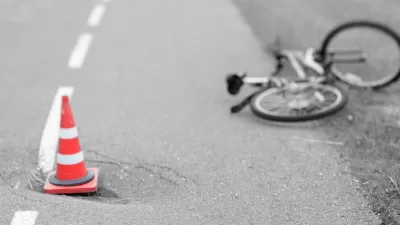Samuel Medina describes how the Dutch use stylistic aesthetics to disguise sections of their satellite images to ward off national threats, as portrayed in Mishka Henner's new book, Dutch Landscapes.
When the launch of Google Earth in 2005 liberated satellites' far-reaching views, concerns of over national security escalated as military, political and economic locations became too visibly public. In response, the Dutch government urged censorship of these vistas by concealing them in geometric forms, as shown in Mishka Henner's Dutch Landscapes.
As Henner notes, "Tracts of land deemed vulnerable to attack or misappropriation are transformed into large tapestries of multi-colored polygons, archipelagos of abstraction floating in swaths of open fields, dense forests, and clusters of urban development."
Medina draws a historical line from this virtual response through the Netherland's physical efforts to protect their country's native land from the threat of disasters both natural and man-made.
FULL STORY: Pixelizing Dutch Landscapes

Maui's Vacation Rental Debate Turns Ugly
Verbal attacks, misinformation campaigns and fistfights plague a high-stakes debate to convert thousands of vacation rentals into long-term housing.

Planetizen Federal Action Tracker
A weekly monitor of how Trump’s orders and actions are impacting planners and planning in America.

In Urban Planning, AI Prompting Could be the New Design Thinking
Creativity has long been key to great urban design. What if we see AI as our new creative partner?

Pedestrian Deaths Drop, Remain Twice as High as in 2009
Fatalities declined by 4 percent in 2024, but the U.S. is still nowhere close to ‘Vision Zero.’

King County Supportive Housing Program Offers Hope for Unhoused Residents
The county is taking a ‘Housing First’ approach that prioritizes getting people into housing, then offering wraparound supportive services.

Researchers Use AI to Get Clearer Picture of US Housing
Analysts are using artificial intelligence to supercharge their research by allowing them to comb through data faster. Though these AI tools can be error prone, they save time and housing researchers are optimistic about the future.
Urban Design for Planners 1: Software Tools
This six-course series explores essential urban design concepts using open source software and equips planners with the tools they need to participate fully in the urban design process.
Planning for Universal Design
Learn the tools for implementing Universal Design in planning regulations.
planning NEXT
Appalachian Highlands Housing Partners
Mpact (founded as Rail~Volution)
City of Camden Redevelopment Agency
City of Astoria
City of Portland
City of Laramie





























